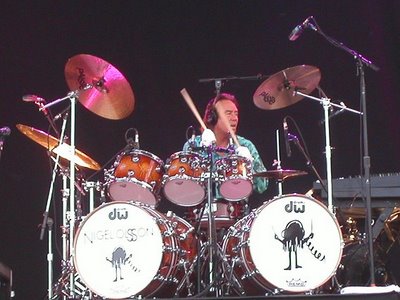
I bought, on sale, a video collection of three Elton John concerts on DVD. I understand, of course, that no one is a fan of Elton John without having been born near-onto half a century ago, and that he might represent a kind of present-day Liberace, a puffy, middle-aged (for about 15 more minutes) queen whose music too easily lends itself to Muzak adaptations (but hey, so does Mozart). But while he has dreadful taste in lyricists (Bernie "Taupin" Taupin blows rim), I maintain that he has a rare talent for melody, and that some of his prolific body of work will endure. I don't know that I need to have his stuff on my desert island, but neither am I too inclined to apologize for him.
Anyway, this collection features the two living members of his original three bandmates: bassist Dee Murray died of cancer a number of years ago, but guitarist Davey Johnstone and drummer Nigel Olsson are back on station with Elton. Interestingly, neither of these guys has had much of a career apart from Elton--the world is full of basically competent musicians of whom none of us has heard--and yet their success with him adds up to quite a career after 30 or so albums and countless tours and appearances. Both now appear as though they might have been aging hipsters a decade or two ago, and it's a little odd to see these dusty grandparents rockin' out. (Have you seen Mick Jagger lately?)
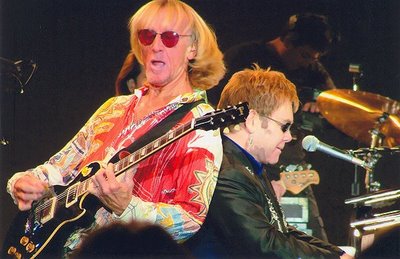
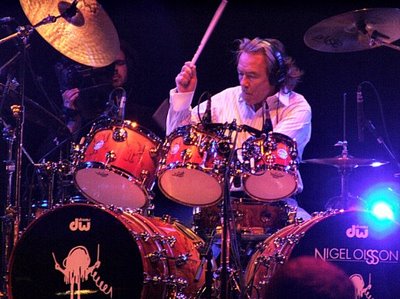
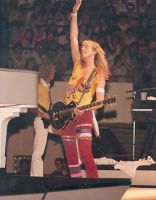 I am not particularly knowledgeable about guitarists, though occasionally one will pull some string in me (Lindsey Buckingham, for example), so I'm not really able to say much meaningful about Davey Johnstone. He seems generally technically competent and has managed a few iconic things, like the guitar work in Saturday Night's All Right or Fighting or The Bitch Is Back. Dude has a fucked-up sense of style, even for 1970.
I am not particularly knowledgeable about guitarists, though occasionally one will pull some string in me (Lindsey Buckingham, for example), so I'm not really able to say much meaningful about Davey Johnstone. He seems generally technically competent and has managed a few iconic things, like the guitar work in Saturday Night's All Right or Fighting or The Bitch Is Back. Dude has a fucked-up sense of style, even for 1970.As a drummer and someone who payed a lot of attention to Elton John's music growing up, Nigel Olsson is another matter for me.
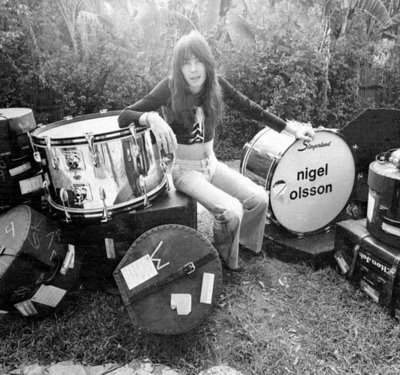
(Well, not in the style department, where he appears to be the love child of aforementioned fucked-up Davey Johnstone's one-night stand with Pocohontas.) I've gone through an evolution in my feelings toward him over the years, only to arrive back at my present condition of qualified reverence. I realized early on from recordings that he was very much a meat and potatoes musician, and I was a bit contemptuous that absolutely nothing he played would challenge the technical skills of even the most modest drummer (as though no musician had a right to the title unless they were demonstrably better than most everyone else). He seemed comfortable within a very narrow range of styles and tempos, and he seems to have learned only one or two drum fills.
A couple decades passed and I woke up one day surprised to find that my admiration of what his talents encompassed had rather got the better of my doubts. Chalk it up to getting older myself and coming to appreciate the absence of musical bullshit. Evaluated from the perspective that the drummer's primary task is keeping time--you might say from a musical standpoint it's the ONLY task--then the scales tip in Nigel's favor. While I continue to think that his range of effectiveness is quite narrow, I've come to think that within his zone he does something that's almost magical. He excels at a certain slow groove, a 4/4 basic rock beat at about 60 bpm (think Captain Fantastic or Lucy In The Sky With Diamonds).
A couple years ago Elton put out a very solid album called "Songs From the West Coast" which featured his old band again. And the new album's opening track, "The Emperor's New Clothes," finds Our Nigel in an almost zenlike perfection of form. I've played drums for years, and what Nigel does on this song, true to form, is the most basic rock beat which I might teach to a junior-highschool kid. And yet if you listen carefully he finds his way to an amazing groove, and I can't for the life of me figure out exactly what is involved in this little zen moment. I'm accustomed to listening closely and dissecting finely, and I can't but shake my head that the simplest thing that Nigel is doing is something I cannot do. I could play this track competently, easily, but I don't think I could bring things to Nigel's place. I tip my hat.
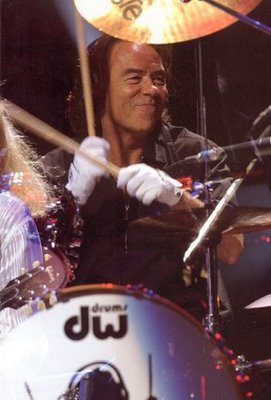
With a CD, there's always a question of what magic might have been wrought in the studio that can't be duplicated live. And so these recorded video performances--and others I've seen over the years--are the more interesting since one gets to watch the artist at work. Watching Nigel play is intriguing but not particularly instructive. His technique appears entirely self-taught, awkward and inefficient. He always plays with gloves, which seems an absurd affectation as he's neither a power player nor does he use his fingers (except to wrap, claw-like, around the sticks--unlike most jazz players, who play with wrists and fingers) to get blisters on them. He plays entirely from the elbow, his wrists being almost locked in place, which gives a lanky, exaggerated scarecrow appearance. It just looks to take a lot more motion and energy than would seem necessary to accomplish the sounds he produces. His left hand is chained to backbeat duty, causing the right hand to have to do everything else. His rather large drum kit seems not particularly comfortable for him, especially his placement of cymbals. He has a crash cymbal on each side of the kit, but he uses only the one on his left side, going through some quite cumbersome maneuvers to avoid the one on the right side. In the end, he LOOKS quite amateurish. Without the studio click track his time is not quite as rock-steady as it is on recording (tho it's a rare drummer whose time is as good out of the studio). But that zen thing is still there, proving, to me anyway, that it's not just a question of the accuracy of his timekeeping that is responsible. Avert your eyes from the distraction of his Ichabod Crane aspect and there's no denying it: whatever it takes to get it, he's got it.
So in the end I'm left wrangling with the question of how one of last century's seminal pop artists happened upon, and settled into some loyalty toward, this guy over so many others who might have taken his place. And it's not some accident on Elton's part, as even after a middle period of working with other bands he has returned to his original group. OK, so I've discovered that musicality and technical prowess are not linked with an unbreakable chain. Big deal. But without retracting the (perhaps a bit backhanded) kudo I've just granted, I still think that this thing he does well--whatever you call it--is still an awfully thin ledge to have built a career and good living off of (to say nothing of the objective oddity of making a good living by being a rock and roll drummer). And I'm still a bit in the dark about how Elton made Nigel his choice. Is Elton so musically savvy that he saw in his early 20s what I've barely seen after 30 years of scrutiny? Was it just luck?
Now comes yet another album from Elton--The Captain and the Kid--this one a homage to that musical high-point where they left off some 30 years before, Captain Fantastic and the Brown Dirt Cowboy. And here's our Nige, still plying his trade, still finding his zen.
2 comments:
Nice trick - taunt us with a title that essentially challenges us to read the post and see if there is any reason for it to even exist.
It is interesting to hear a drummer's perspective. I think most of us either hardly notice the drummer, or even worse see him as the bumbling half-wit who couldn't manage to actually make any other contribution to the performance (think Ringo Starr). Maybe it has something to do with pop music not having much for a drummer to do.
Before pop we had big bands with many examples of well-known, really good drummers that were a featured part of the performance (think Gene Krupa or Buddy Rich).
I don't know of any good drummers from Great Britain, maybe Nigel was Elton's pick mostly out of desperation.
Ah, but the trick WORKED!
I think a drummer can, of course, be a great musical mind who just happens to play a percussion instrument (that is, even though rhythm may be a limited sphere, a drummer need not be restricted to it). But it's interesting, to me anyway, to see how that musicianly quality shows itself from behind a drum kit.
You may be right about Elton's desperation pick. The oddity to me is that Nigel actually IS very good, but in a quite subtle and un-drummer-like way. Whoda thunk?
Post a Comment